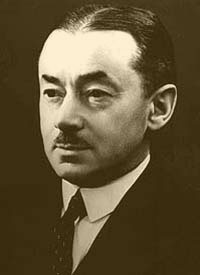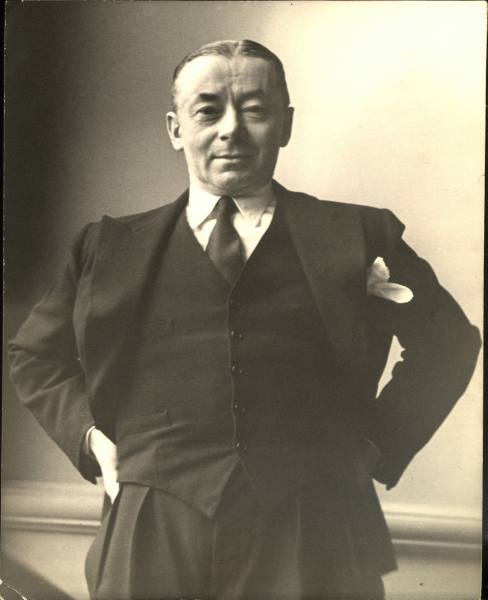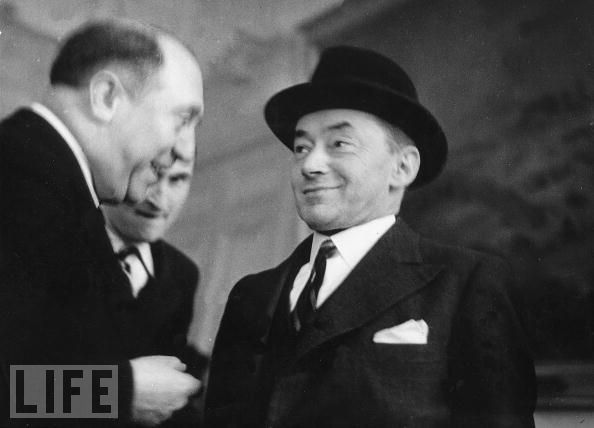<Back to Index>
- Philosopher Friedrich Wilhelm Nietzsche, 1844
- Painter James Jacques Joseph Tissot, 1836
- Prime Minister of France Paul Reynaud, 1878
PAGE SPONSOR


Paul Reynaud (15 October 1878 - 21 September 1966) was a French politician and lawyer prominent in the interwar period, noted for his stances on economic liberalism and militant opposition to Germany. He was the penultimate Prime Minister of the Third Republic and vice-president of the Democratic Republican Alliance center-right party.
Reynaud was born in Barcelonnette, Alpes-de-Haute-Provence. His father had made a fortune in the textile industry, enabling Reynaud to study law at the Sorbonne. Reynaud was elected to the French Chamber of Deputies from 1919 to 1924, representing Basses - Alpes, and again from 1928, representing a Paris district. Although he was first elected as part of the conservative "Blue Horizon" bloc in 1919, Reynaud shortly thereafter switched his allegiance to the center right Democratic Republican Alliance party. Reynaud later became the vice-president of his party.
In the 1920s, Reynaud developed a reputation for laxity on German reparations, at a time when many in the French government backed harsher terms for Germany. In the 1930s, particularly after 1933, Reynaud's stance hardened against the Germans. Reynaud backed a strong alliance with the United Kingdom and, unlike many others on the French Right, better relations with the Soviet Union as a counterweight against the Germans.
Reynaud
held several cabinet posts in the early 1930s, but he clashed with
members of his party after 1932 over French foreign and defense policy
and was not given another cabinet position until 1938. Like Winston Churchill,
Reynaud was a maverick in his party and often alone in his calls for
rearmament and resistance to German aggrandizement. Reynaud was a
supporter of Charles de Gaulle's theories of mechanized warfare in contrast to the static defense doctrines that were in vogue among many of his countrymen, symbolized by the Maginot Line, and was an outspoken opponent of appeasement in the run-up to the Second World War. He also clashed with his party on economic policy, backing the devaluation of the franc as a solution to France's economic woes. However, Pierre Étienne Flandin,
the leader of the Democratic Republican Alliance, agreed with several
of Reynaud's key policy stances, particularly on Reynaud's defense of
economic liberalism. Reynaud returned to the cabinet in 1938 as Minister of Justice under Édouard Daladier. The Sudeten Crisis,
which began not long after Reynaud was named Minister of Justice, again
revealed the divide between Reynaud and the rest of the Alliance
Démocratique; Reynaud adamantly opposed abandoning the Czechs to
the Germans, while Flandin felt that allowing Germany to expand
eastward would inevitably lead to a conflict with the Soviets that
would weaken both. Reynaud publicly made his case, and in response
Flandin pamphleted Paris in order to pressure the government to agree
to Hitler's demands. Reynaud subsequently left his party to become an independent. Reynaud still had Daladier's support, however, whose politique de fermeté was very similar to Reynaud's notion of deterrence. Reynaud,
however, had always wanted the Finance ministry. He endorsed radically
liberal economic policies in order to draw France's economy out of
stagnation, centered on a massive program of deregulation, including
the elimination of the forty-hour work week. The
notion of deregulation was very popular among France's businessmen, and
Reynaud believed that it was the best way for France to regain
investors' confidence again and escape the stagnation its economy had
fallen into. The collapse of Léon Blum's
government in 1938 was a response to Blum's attempt to expand the
regulatory powers of the French government; there was therefore
considerable support in the French government for an alternative
approach like Reynaud's. Paul Marchandeau,
Daladier's first choice for finance minister, offered a limited program
of economic reform that was not to Daladier's satisfaction; Reynaud and
Daladier swapped portfolios, and Reynaud went ahead with his radical
liberalization reforms. Reynaud's reforms were successfully
implemented, and the government stood down a one-day strike in
opposition. Reynaud addressed France's business community, arguing that
"We live in a capitalist system. For it to function we must obey its
laws. These are the laws of profits, individual risk, free markets, and
growth by competition." Reynaud's
reforms proved remarkably successful; a massive austerity program was
implemented (although armament measures were not cut) and France's
coffers expanded from 37 billion francs in September 1938 to 48 billion
francs at the outbreak of war a year later. More importantly, France's
industrial productivity jumped from 76 to 100 (base = 1929) from October
1938 to May 1939. At
the outbreak of war, however, Reynaud was not bullish on France's
economy; he felt that the massive increase in spending that a war required would
stamp out France's recovery. The
French Right was ambivalent about the war in late 1939 and early 1940,
feeling that the greater threat was from the Soviets. The Winter War put
these problems into stark relief; Daladier refused to send aid to the
Finns while war with Germany continued. News of the Soviet - Finnish
armistice in March 1940 prompted Flandin and Pierre Laval to
hold secret sessions of the legislature that denounced Daladier's
actions; the government fell on 19 March. The government named Reynaud Prime Minister of France two days later. Although
Reynaud was increasingly popular, the Chamber of Deputies elected
Reynaud premier by only a single vote with most of his own party
abstaining; over half of the votes for Reynaud came from the French Section of the Workers' International (SFIO)
party. With so much support from the left - and the opposition from
many parties on the right - Reynaud's government was especially
unstable; many on the Right demanded that Reynaud attack not Germany,
but the Soviet Union. The Chamber also forced Daladier, whom Reynaud held personally responsible for France's weakness, to be Reynaud's Minister of National Defense and War. One of Reynaud's first acts was to sign a declaration with British Prime Minister Neville Chamberlain that neither of the two countries would sign a separate peace. Reynaud
abandoned any notion of a "long war strategy" based on attrition.
Reynaud entertained suggestions to expand the war to the Balkans or
northern Europe; he was instrumental in launching the allied campaign in Norway,
though it ended in failure. Britain's decision to withdraw on 26 April
prompted Reynaud to travel to London to personally lobby the British to
stand and fight in Norway. The Battle of France began
less than two months after Reynaud came to office. France was badly
mauled by the initial attack in early May 1940, and Paris was
threatened. On 15 May, five days after the invasion began, Reynaud
contacted his British counterpart and famously remarked, "We have been
defeated... we are beaten; we have lost the battle.... The front is
broken near Sedan." Charles de Gaulle, whom Reynaud had long supported and one of the few French commanders to
have fought the Germans successfully in 1940, was promoted to brigadier general and named undersecretary of war. As France's situation grew increasingly desperate, Reynaud accepted Philippe Pétain as
Minister of State. Pétain, an aged veteran of the First World
War, advised an armistice. Soon after the occupation of Paris, there
was increasing pressure on Reynaud to come to a separate peace with
Germany. Reynaud refused to be a party to such an undertaking, and was
among the few in the cabinet to support accepting the British proposal
on 16 June to unite France and the United Kingdom to
avoid surrender. Discouraged by the cabinet's hostile reaction to the
proposal and its preference for an armistice, and believing that his
ministers no longer supported him, Reynaud
resigned that evening. Pétain, who became the leader of the new
government (the last one of the Third Republic), signed the armistice
on 22 June. Reynaud was arrested on Pétain's orders. However,
Pétain finally decided not to have him judged during the Riom Trial,
and he was given to the Germans, who kept him prisoner until the end of
the war. Reynaud was liberated by Allied troops with other French personalities in the Itter Castle near Wörgl, Austria, on 7 May 1945. After
the war, Reynaud was made again a member of the Chamber of Deputies in
1946. Reynaud was in several cabinet positions in the postwar period
and remained a prominent figure in French politics, although his
attempts to form governments in 1952 and 1953 in the turbulent politics
of the French Fourth Republic were failures. Reynaud supported the idea of a United States of Europe,
along with a number of prominent contemporaries. Reynaud presided over
the consultative committee that drafted the constitution of France's
(current) Fifth Republic. In 1962, Reynaud denounced his old friend de Gaulle's attempt to eliminate the electoral college system in favor of direct vote. Reynaud left office the same year. Reynaud remarried in 1949 at the age of 71 and went on to father three children. Reynaud died on 21 September 1966 at Neuilly-sur-Seine, leaving a number of writings.
